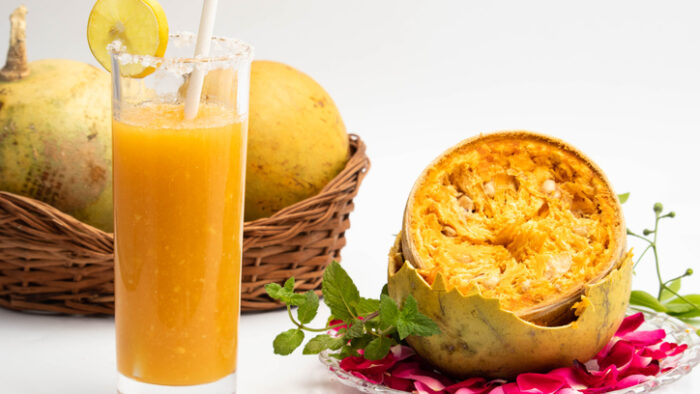At the entrance of the grounds of the Hindu mandir, a group of trees commonly greets us. They are often considered holy, and their leaves and parts are used in worship and puja. Especially at the temples of Shiva in warmer regions of India, we commonly meet the bel tree, known as bilwa in Sanskrit, with its thorns and a distinct three-leaf formation that is settled into a brass pot at the feet of the Shiva Lingam.

The bel/bael is considered one of the most potent drugs in Ayurveda for treating crampy belly, irritated bowels or IBS. In olden times, all people knew that bel fruits were useful for maintaining the health of the gut. When the fruit grew at the first heat of summer, one bel fruit was taken from the tree before it ripened fully. Its outer shell was hard, but it was not yet fully pink-yellow. This was commonly added to the daily diet to keep the gut healthy in the heat, when the digestive fires were low, and food spoiled easily. For people with mrdu-kosttha, a tender belly that tends to get upset easily, the juice of the bel fruit is offered each morning during the hot season as a refreshing drink to maintain the health of a person.
If a person did have an upset stomach, the unripe bel fruit was immediately collected, cracked open, and scraped to collect the pulp. This was mixed with ghee/oil and sugar and given to reduce the discomfort. Normalcy in the digestive tract occurred quickly. If it had not, this age-old remedy would not be in use even today in many parts of India.
Bilwa is commonly known as the bel tree with the botanical name Aegle marmelos. It is commonly seen across India in warmer zones. As a thorny tree that grows to 8-15 meters in height, its distinct feature is a trifoliate leaf that symbolizes the trishul that is often used in pujas as the tree is considered holy and can especially be seen around Shiva temples.

The roots, leaves and unripened fruits are used for therapeutic purposes. The bel tree is classified in Ayurveda as bitter and astringent in taste; light-to-digest and slightly snigdha (unctuous) in quality; and heating once inside the body (usna-virya).
Its use as a food is related to its abundant therapeutic usage, typifying the adage that food is medicine. The unripe bel fruit is used in combination with related gut medicines for the treatment of diarrhea. The ripe fruit is avoided as it aggravates all three doshas. The juice of bel leaves are used for bathing especially to reduce foul odor from the body. The oil of the fruit, bilwa taila, is used drop-by-drop with guidance of an ayurvedic physician in the treatment of deafness. The unripe bilwa fruit is mainly described by ancient physicians for the treatment of various gastrointestinal disorders - diarrhea, irritable bowel syndrome, distension of abdomen, and piles.
Because bilwa fruit is so good for our digestive system, it has evolved into a food. Many will break the hard outer shell of an unripe fruit, scrape the pulp out, remove the seeds and fibrous material, mix with clean water, and drink a glass of bilwa pulp juice each and every morning. It has been found to reduce blood sugar and keep the belly calm and happy.
As a vegetable used in cooking, the bel fruit should always be used in the unripe form to avoid inducing disease by aggravating all the doshas when eating a food quantity of the fruit.
After the fruit pulp is removed, it should be inspected. The fruit should be fresh, fragrant and light in color with no dark or grainy areas. This fruit pulp is then chopped into small pieces, fried in hot oil until it is half cooked, then tempered with spices such as hing, turmeric, jeera (cumin) powder, dhāniya (coriander) powder, fresh ginger, and black pepper powder. Black pepper powder should be added in higher quantity than the other spices due to its penetrating power. This mix is cooked on low to medium heat until the fruit is cooked completely, feeling soft and supple. While this preparation is usually somewhat bitter in taste and thus used to start the meal, it helps increase the sense of taste and stimulates awareness of flavors during the rest of the meal.
Bel fruit should be avoided by pregnant women as it is heating in nature. Those having constipation problems should be careful as the reason for chronic constipation is sometimes dryness of the gut, which is exacerbated by bel.
Those having chronic digestion problems should consult an ayurvedic physician, who can modulate the form, the amount, the combination with other substances, and the timing, so that consumption of bel is useful.




